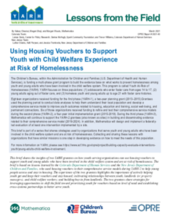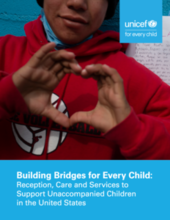Displaying 341 - 350 of 2221
This study examined the rates and correlates of first and repeat births in a national sample of females emancipating from foster care in the United States.
The current study used a resilience framework to describe youth experiences with their caseworkers, examine the association of youth–caseworker relationship quality with school engagement, and to examine the differential impact of youth–caseworker relationships on youth school engagement by level of youth risk (i.e. posttraumatic symptoms).
This study uses a retrospective pre/post design to measure the impact of the pandemic on foster carers’ self-care.
The present study seeks to examine the goals that carers who are looking after children with emotional and/or behavioural difficulties set at the start of an intervention, the Reflective Fostering Programme, designed to support them.
This study was designed to explore whether the incidence of child maltreatment among patients presenting to a pediatric emergency department has increased during the COVID-19 pandemic.
This brief is part of a series that shares strategies used by organizations that serve youth and young adults who have been involved in the child welfare system and are at risk of homelessness. It examines a multi-phase grant program to build the evidence base on what works to prevent homelessness among youth and young adults who have been involved in the child welfare system in the U.S.
This mixed-methods study used an integrated approach to investigate the drivers that impact the transition from student to child welfare professional and factors that motivated a highly trained cohort of child welfare professionals to stay or leave the child welfare workforce (post one–year employment).
The current study utilized survey data to determine if respondent characteristics and inter‐rater agreement on measures of important relationships were associated with resilience among child welfare‐involved youth.
This study addresses a gap in the literature regarding older youth with intellectual disabilities who are sexually victimized and pushed to engage in transactional sex while they are transitioning from child welfare systems involvement. It does so by examining risk and protective factors at the individual, micro, exo, and macro systems levels.
UNICEF’s new report, Building Bridges for Every Child: Reception, Care and Services to Support Unaccompanied Children in the United States, considers global discussions on adequate reception and care for unaccompanied migrant and asylum-seeking children. Following the journey of children traveling alone from northern Central America to the U.S. – entering, navigating and leaving the U.S. reception and care system and transitioning to community life – this report presents eight overarching recommendations for the realization of a better and more equitable system of care and support for every child.


